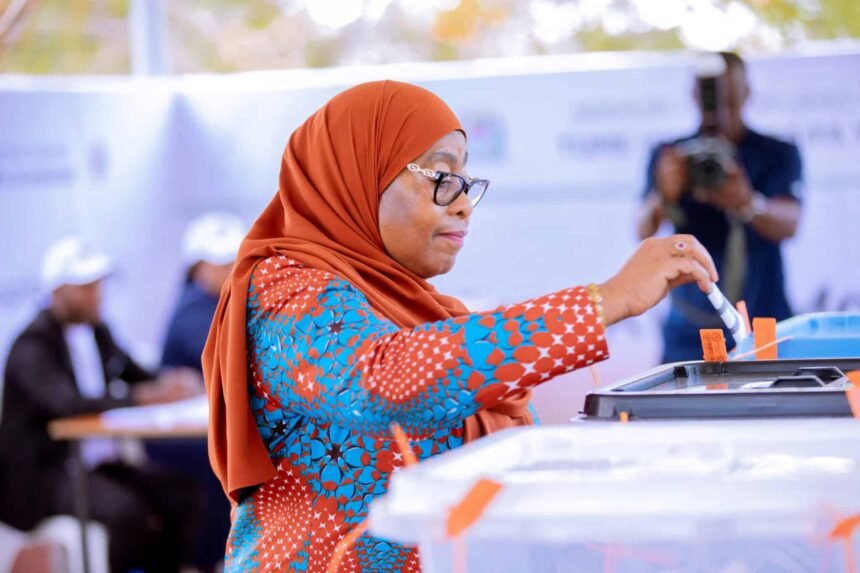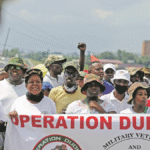DODOMA, Tanzania (Elevation News) — What should have been a moment of renewal for Tanzania has become a symbol of Africa’s deepening democratic despair.
President Samia Suluhu Hassan was sworn in for a second term surrounded by soldiers, silence, and suspicion. Her inauguration, held under tight security at a military parade ground in Dodoma, was closed to the public and broadcast only on state television. The scene reflected a presidency growing increasingly distant from the people it claims to represent.
The ceremony came after one of the bloodiest elections in recent African history. Hundreds of people are feared dead, thousands have been injured, and the streets of Tanzania’s cities are filled with fear and anger.
President Samia was declared the winner with 98% of the vote, facing almost no competition. Key opposition figures were imprisoned, disqualified, or driven into exile. Many polling stations across the country stood empty on election day, despite official claims of a high voter turnout.
Her government maintains that the poll was “free and democratic,” yet to many Tanzanians, it signified the collapse of electoral legitimacy and a widening gap between rulers and the ruled.
“The truth is that no genuine election took place in Tanzania,” said the opposition Chadema party, which was barred from participating and has called for a new vote.
International observers and diplomats have criticised the election, describing it as a “mockery of democracy.” Similar crises across Africa are exposing the fragility of democratic institutions, and in some cases, paving the way for military interventions. From Niger to Gabon, coups have become both a symptom and a consequence of failing leadership.
The aftermath of the vote has plunged Tanzania into economic paralysis and social chaos. In cities such as Arusha, Mwanza, and Mbeya, soldiers patrol the streets, shops are shuttered, and ordinary citizens live in fear.
The UN Human Rights Office confirmed credible reports of at least 10 deaths, while opposition leaders and civil society groups estimate that as many as 800 people may have died. A nationwide internet blackout, imposed on election day, has made independent verification impossible.
Prices of food and fuel have soared, schools remain closed, and public transport has been suspended in several areas. Tanzanians now speak of a government that governs from behind barricades, isolated from its citizens and unwilling to listen.
“The leadership is at war with its own people,” said one opposition activist who spoke anonymously for fear of retaliation. “We voted for democracy, and we got dictatorship.”
In her victory speech, President Samia dismissed the violence as the work of “unpatriotic elements.” Her comments contrasted sharply with images of grieving families and burned-out homes circulating on social media before the blackout.
Police spokesman David Misime blamed “foreign agitators” for the unrest, claiming that outsiders had entered the country illegally to incite chaos. Critics say this is an attempt to deflect blame from a government that has turned its power inward, targeting its own citizens instead of protecting them.
Once celebrated as a symbol of reform and inclusion, Samia now faces accusations of authoritarianism and political intolerance.
Tanzania’s turmoil mirrors a wider pattern across Africa, where leaders rise from liberation movements but later consolidate power at the expense of democracy. Elections have become rituals to maintain control, and dissent is increasingly criminalised.
As public trust collapses, militaries across the continent are watching and waiting. Each time a government claims near-total victory, each time protesters are silenced with bullets, the unspoken question grows louder: when democracy fails, who steps in next?
The international community has expressed alarm. UN Secretary-General António Guterres said he was “deeply disturbed” by reports of deaths and injuries. EU foreign affairs chief Kaja Kallas urged Tanzanian authorities to show restraint, while Pope Leo XIV called for prayers for the “numerous victims of political violence.”
But Tanzanians are not asking for sympathy, they are asking for leadership that listens and serves.
Once hailed as a beacon of Pan-African unity under Julius Nyerere, Tanzania stood for equality, dialogue, and nation-building. Today, that vision is fading as leaders drift further from the people.
Samia’s second term may secure her power, but it risks eroding the very foundation of Tanzania’s democracy. For many, this is no longer about politics but about survival, dignity, and the fight to reclaim the voice of the people.
Across Africa, the message is clear. When leaders choose power over accountability, when elections silence rather than empower, the cracks in democracy become gateways to revolt. Tanzania’s story is a warning to the continent: the fall of trust between leaders and their citizens may yet be the spark that ignites the next wave of instability.










